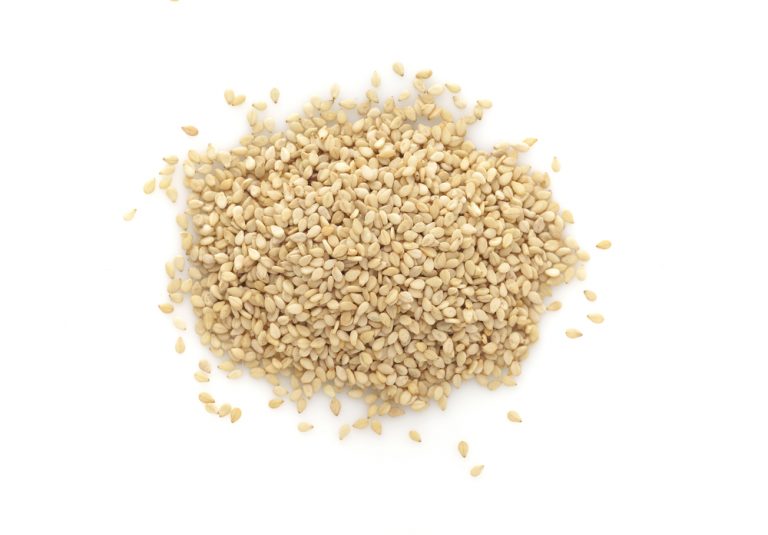SESAME
SESAME BENIFITS
Sesame seeds, though small in size, are a giant when it comes to their health benefits. These tiny, oil-rich seeds have been used in traditional medicines for thousands of years. Beyond their widespread use in cooking, they offer a plethora of health benefits. In this blog post, we will delve into the benefits of both white and black sesame seeds, with a particular emphasis on their benefits for women, skin, and hair.
White Sesame Seeds vs. Black Sesame Seeds: A Nutritional Showdown
While both white and black sesame seeds are nutritionally beneficial, there are slight differences between the two.
White sesame seeds have a slightly sweeter flavor and are commonly used in baking and cooking. They are a good source of protein, fiber, and healthy fats. They also contain a significant amount of calcium, making them a great addition to a woman’s diet.
Black sesame seeds, on the other hand, have a stronger, earthier flavor. They are often used in traditional Chinese medicine for their health-promoting properties. Black sesame seeds are known for their high iron content, which can be particularly beneficial for women who are at risk of anemia.
Sesame seeds are a good source of healthy fats, containing both polyunsaturated and monounsaturated fatty acids. The seeds are also very high in many essential nutrients, including copper, manganese, calcium, iron, magnesium, and phosphorus – just to name a few. With so much to offer in terms of health and nutrition, start today by cooking your meals in sesame seed oil, or just sprinkle them on your morning salad, smoothies, oatmeal, etc. You can also use sesame seed as a topping to garnish your bagel, burger, bread, etc.
The Benefits of Sesame Seeds for Skin and Hair
Sesame seeds are a boon for skin and hair health. The rich array of antioxidants and anti-inflammatory compounds in sesame seeds can help maintain healthy skin, reduce signs of aging, and promote a radiant complexion. Sesame oil, extracted from sesame seeds, can be used topically to moisturize the skin, treat sunburns, and heal minor wounds.
When it comes to hair health, sesame seeds are a powerhouse. They can help promote hair growth, combat hair loss, and restore the natural color of your hair. Black sesame seeds, in particular, are known for their potential to improve hair health and maintain natural color. Regularly massaging your scalp with sesame oil can nourish the hair follicles, improve blood circulation, and promote healthier and thicker hair.
SESAME Seed’s Benefits for Women’s Health
Females, in particular, can derive a multitude of benefits from incorporating sesame seeds into their diet. Sesame seeds are a rich source of calcium, a crucial nutrient for maintaining bone health. This is particularly important for women, who are more susceptible to osteoporosis, a condition that weakens bones and makes them fragile.
The folic acid present in sesame seeds is essential for pregnant women, as it aids in the healthy development of the fetus. Moreover, the seeds are packed with iron, a mineral that many women are deficient in, especially during their reproductive years. Sesame seeds, and particularly sesame oil, have been used in Ayurvedic medicine for centuries to balance hormonal fluctuations in women. Regular consumption of sesame seeds or sesame oil can help alleviate symptoms associated with menstruation and menopause, such as mood swings, hot flashes, and sleep disturbances.
Male Health with Black Sesame Seeds
Black sesame seeds are tiny powerhouses of nutrition, offering a range of benefits specifically tailored to men’s health. Here’s how they can contribute:
Prostate Power: Black sesame seeds are rich in zinc, a mineral vital for prostate health. Regular consumption can help maintain a healthy prostate and potentially ward off conditions like benign prostatic hyperplasia (BPH) and prostate cancer.
Digestive Health: The dietary fiber in sesame seeds aids in digestion by adding bulk to the stool, which can help prevent constipation and promote regular bowel movements. This can contribute to overall digestive health and help prevent conditions like irritable bowel syndrome and diverticulitis.
Weight Management: The fiber content in sesame seeds also plays a role in weight management. Dietary fiber can promote a feeling of fullness, reducing overeating and helping to control weight.
Diabetes Management: With a low glycemic index, sesame seeds are a good choice for people with diabetes. They can help regulate blood sugar levels and prevent spikes and crashes that can be harmful to individuals with diabetes.
How to Incorporate Sesame Seeds into Your Diet
Incorporating sesame seeds into your diet is easy and versatile. They can be added to a variety of dishes to enhance flavor and nutritional value.
Salads and Stir-fries: Sprinkle sesame seeds over salads or stir-fries for a crunchy texture and a nutty flavor.
Cereals and Yogurt: Add them to your morning cereal or yogurt for a nutritious start to your day.
Bread and Pastries: Use them as a garnish for bread and pastries to add a touch of crunch and a boost of nutrients.
Sesame Oil: Sesame oil, extracted from sesame seeds, can be used for cooking or as a dressing for salads. It has a distinctive flavor that can enhance a variety of dishes.
Tahini: Tahini, a paste made from ground sesame seeds, can be used in dips, spreads, and sauces. It’s a key ingredient in hummus and can also be used in salad dressings or as a spread on toast.
